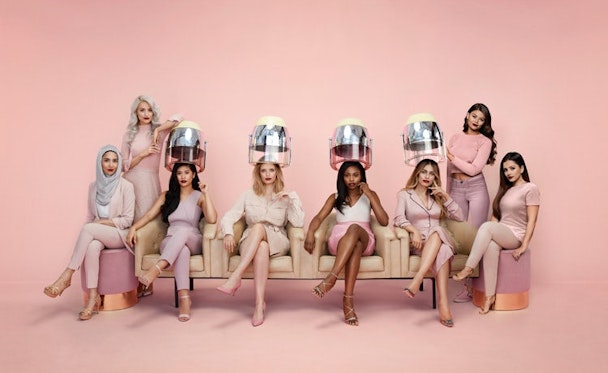L'Oréal, eBay and Diageo have already started to address the problem of influencer fraud
Unilever’s rallying call for a crackdown on fraudulent influencer marketing has revealed that other advertisers have been contemplating the issue for some time. Some, like eBay and Diageo, are revaluating what an “influencer” really is, while others, such as L'Oréal, have opened up on the extensive vetting processes that should be in place if a brand is investing significant spend.

L'Oréal doesn't see influencers as a transaction, but eBay is mulling over its strategy after Unilever's call to arms / L'oreal
Unilever used the Cannes Lions festival to announce to the global ad industry that it will no longer work with influencers that buy followers and prioritise spend on social platforms that work to eradicate nefarious practices throughout the digital ecosystem.
The FMCG-giant's manifesto, which has since dominated conversation at the event, has aimed to improve the "integrity" of the ecosystem. But the response from other big-budget advertisers has thus far been surprisingly muted, with many saying they've already been quietly contemplating the value of influencer investment.
Shifting spend towards brand advocates
One brand already reviewing its spend is Ebay. The online marketplace has invested heavily in influencer marketing, even launching a dedicated Influencer Network in order to scatter paid-for advertising across a wide mix of social talent.
Responding to the call from Unilever, eBay’s chief marketing officer for EMEA, Godert van Dedem, said its approach has been to siphon its budgets into promoting the marketplace’s sellers, rather than traditional “influencers” on social networks.
Speaking to The Drum, van Dedem said it had been reworking this social strategy long before Weed cracked the whip on influencers who buy fraudulent followers.
“I’m a little bit in the same mind [as Weed],” he said. “What I want us to do is give our sellers a voice, rather than [give it to] influencers who happen to have a following that we use and pay for."
He explained that eBay’s sellers – particularly those that operate their own small businesses through the platform – present themselves as more attractive alternative influencers, especially as the brand embarks on a “myth-busting” campaign to prove it’s a site on the cutting edge of e-commerce.
“Our sellers are very passionate," van Dedem said, "and they're very authentic because it’s clear they want to sell products. They can tell a story about why they do that.
"I want to shift some of our influencer spend towards that class of influencers, because they’re very specific to eBay, they’re very authentic and as a result I believe they’re very helpful to the buyers to get truly inspired."
Syl Saller, chief marketing officer of Diageo, agreed with this assessment. In the same way that eBay plans to tap into its seller base, Saller explained there is potential to utilise Diageo's community of mixologists – skilled professionals that carry influence without being 'influencers' per se.
"Using [mixologists] in that really natural, symbiotic relationship that’s transparent to the consumer is, I think, the direction of travel," she said.
However, Saller declined to confirm if this shift in “direction” would lead to spending less with the influencers traditionally associated with Instagram, Facebook or Twitter.
Not a 'transactional' buy
Other brands that have long-worked with online talent aren’t convinced that an overhaul akin to Unilever’s is necessary.
L'Oréal's chief digital offer, Lubomira Rochet, told The Drum that it won’t change the way it works with influencers, saying it already has “robust” systems in place to ensure the value of its social talent spend.
When pressed on whether the cosmetics behemoth will pull back on this area of marketing spend following Weed’s call to action, the answer was a firm “no”.
“We don’t see that," she said. "We’re really careful in selecting influencers and only working with ones we believe have an authentic following and audience."
Rochet explained that L'Oréal has stopped viewing influencer marketing as a "transactional" media buy, and instead sought to forge long-term relationships with a number of cherry-picked creators by using a data to identify the most relevant people to appeal to a particular brand's audience.
"Then, by creating long-term relationships [with them] we grow together. Our influencers are starting to have more influence over our product development," she added. "We see this working for us, and what we also see is that there’s a movement towards micro-influencers."
When it comes to measurement, around which Weed has called for greater transparency, L'Oréal relies on its 'cockpit' – an internal tool that lets it monitor more than 20,000 open data sources in real-time.
For influencer campaigns, the brand can use these insights to monitor the earned media value (EMV) it's creating with brands through social buzz. It can also track the performance of these campaigns so it has what Rochet claims to be a "very clear, real-time" view of the ROI.
The marketer continued: "If we see that some investments aren’t performing then we re-invest in other channels. We don’t rely on the influencer’s own metrics."
It's not known what share of its €7.5bn adspend the French beauty conglomerate spends on influencers, but it has previously run significant campaigns for flagship brands like L'Oréal Paris and NYX.
It's likely that Unilever's announcement will dominate the brand-focused panels at Cannes Lions throughout the rest of the week. The Dove owner is poised to hold talks with the World Federation of Advertisers (WFA) and Instagram over the next five days in a bid to galvanize the movement.
